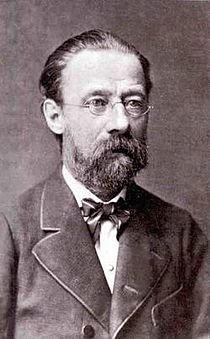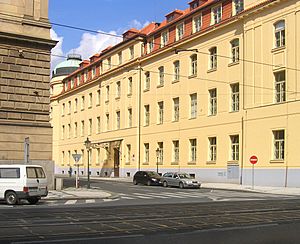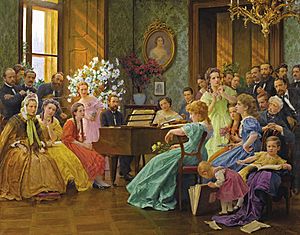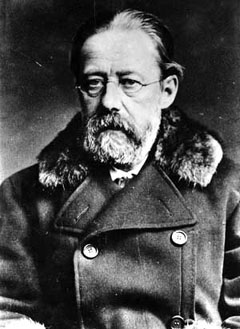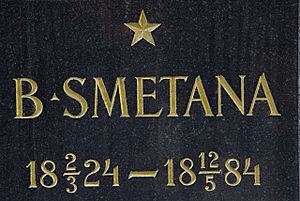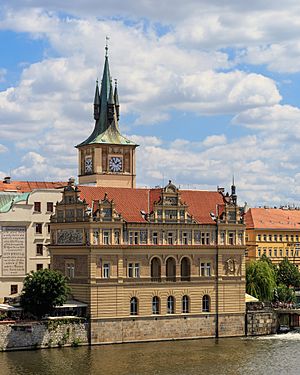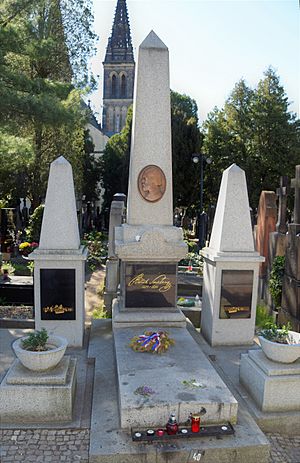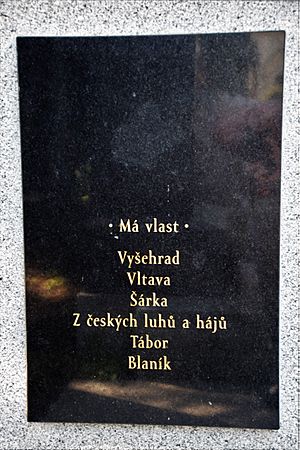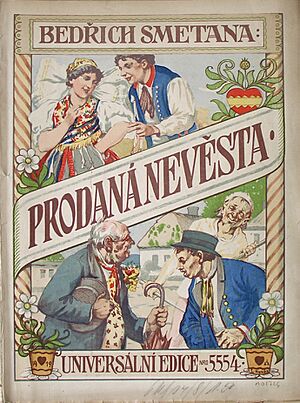Bedřich Smetana facts for kids
Bedřich Smetana (born March 2, 1824 – died May 12, 1884) was a famous Czech composer. He helped create a new kind of music that showed the spirit and hopes of the Czech people. Many people in his home country call him the "father of Czech music."
Around the world, he is most famous for his 1866 opera The Bartered Bride. He is also known for his music cycle Má vlast ("My Fatherland"). This work tells stories about the history, legends, and beautiful places of his home, Bohemia. It includes the very popular piece "Vltava", also known as "The Moldau".
Smetana was a natural musical talent. He gave his first public show when he was just 6 years old. He later studied music in Prague with Josef Proksch. He wrote his first patriotic music during the 1848 Prague uprising, where he even took part for a short time. When he couldn't find much success in Prague, he moved to Sweden. There, he worked as a teacher and choir leader in Gothenburg. This is where he started writing big orchestral pieces.
In the early 1860s, the political situation in Bohemia became more open. This encouraged Smetana to move back to Prague for good. He quickly became a big part of the city's music scene. He especially supported the new style of Czech opera. In 1866, his first two operas, The Brandenburgers in Bohemia and The Bartered Bride, were first shown at Prague's new Provisional Theatre. The Bartered Bride became very popular.
That same year, Smetana became the main conductor of the theatre. However, his time as conductor was full of arguments. Some people in Prague's music world thought his modern ideas, like those of Franz Liszt and Richard Wagner, were bad for Czech opera. This made it hard for him to create new music. It might have also made his health worse, leading him to leave the theatre in 1874.
By the end of 1874, Smetana became completely deaf. But, being free from his theatre duties and the arguments, he started writing a lot of music. He kept composing for almost the rest of his life. People began to recognize and honor his contributions to Czech music more and more. Sadly, he had a mental breakdown in early 1884. He was taken to a special hospital and died soon after. Smetana is still seen as the founder of Czech music in his home country. However, only a few of his works are known internationally. Many foreign experts often see Antonín Dvořák as a more important Czech composer.
Contents
About Smetana's Life
Early Years and Family
Bedřich Smetana was born on March 2, 1824, in Litomyšl. This town is east of Prague, near the border between Bohemia and Moravia. These areas were part of the Habsburg Empire at the time. He was the third child and first son of František Smetana and his third wife, Barbora Linková.
František Smetana was a brewer and had become quite wealthy. He played the violin in a music group, and Barbora Smetana was a dancer. Bedřich learned about music from his father. In October 1830, when he was six, he played the piano in public for the first time. He played a piece by Daniel Auber and everyone loved it.
In 1831, his family moved to Jindřichův Hradec. Here, Smetana went to school and studied violin and piano. He discovered the music of Mozart and Beethoven. He also started writing simple pieces.
In 1835, his father retired. Smetana was sent to different schools. He eventually went to Prague's Academic Grammar School in 1839. There, he studied under Josef Jungmann, a famous poet and linguist. Jungmann was a key leader in the Czech National Revival, a movement to bring back Czech culture.
Becoming a Musician
First Steps in Prague
Smetana arrived in Prague in the autumn of 1839. He didn't like his school and often skipped classes. Instead, he went to concerts, the opera, and listened to military bands. He also joined an amateur string quartet and wrote simple pieces for them.
After the famous pianist Franz Liszt gave concerts in Prague, Smetana decided he wanted a music career. He wrote in his journal that he wanted "to become a Mozart in composition and a Liszt in technique." But his father found out about his skipped classes and took him out of Prague. His father saw music as a hobby, not a job. Smetana stayed with his uncle and wrote Louisa's Polka, one of his earliest complete pieces that still exists.
In 1840, Smetana went to Plzeň to finish school. He stayed there until 1843. He was a popular pianist at parties and had a busy social life. He also fell in love with Kateřina Kolářová, whom he had known as a child. He wrote several pieces for her.
Student and Teacher
When Smetana finished school, his father could no longer support him financially. In August 1843, Smetana went to Prague with little money and no job. Kateřina Kolářová's mother introduced him to Josef Proksch, who ran the Prague Music Institute. Smetana began composition lessons with Proksch. In January 1844, Smetana got a job as a music teacher for a noble family, Count Thun. This helped him with money. During his studies, Proksch introduced Smetana to both Liszt and Hector Berlioz.
For the next three years, Smetana taught and studied with Proksch. He wrote songs, dances, and piano pieces. In 1846, he met Berlioz at a party. He also met Robert Schumann and Clara Schumann at Count Thun's home. He showed them his G minor sonata, but they didn't like it much. His friendship with Kateřina grew stronger. In June 1847, Smetana left his teaching job and suggested Kateřina take his place. He then tried to become a concert pianist, but it didn't work out.
Early Career
Revolutionary Times
Smetana's concert tour was not successful. He went back to Prague and earned money by teaching and playing piano at concerts. He also started his first big orchestral work, the Overture in D major.
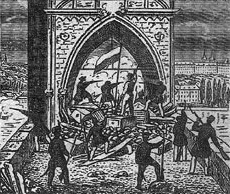
For a short time in 1848, Smetana was a revolutionary. Europe was full of political changes. In Prague, a group led by Smetana's friend Karel Havlíček wanted more freedom from the Habsburg rulers. A Citizens' Army was formed to protect the city. Smetana wrote patriotic music, including marches for the Czech National Guard. In June 1848, Austrian forces attacked Prague. Smetana, as a member of the Citizens' Army, helped build barricades on the Charles Bridge. The uprising was quickly stopped, but Smetana was not arrested. During this time, he met the writer Karel Sabina, who later wrote the stories for Smetana's first two operas.
Piano Institute and Marriage
In early 1848, Smetana wrote to Franz Liszt, asking him to help publish his new piano work. He also asked for a loan to open a music school. Liszt agreed to help with publishing but didn't offer money. This was the start of a valuable friendship for Smetana.
Despite no loan from Liszt, Smetana opened a Piano Institute in August 1848. It started with twelve students. After some hard times, the Institute became popular, especially among those who supported Czech nationalism. In 1849, the school moved to Kateřina's parents' home. Famous people, including the former Austrian emperor Ferdinand, visited the school's concerts. Smetana's performances became a known part of Prague's music life. With more financial stability, Smetana married Kateřina Kolářová on August 27, 1849. They had four daughters between 1851 and 1855.
Becoming a Composer
In 1850, Smetana became the Court Pianist for Emperor Ferdinand in Prague Castle. He kept teaching and focused more on composing. His works, mostly for piano, included Wedding Scenes and many short pieces called Album Leaves. He also wrote several polkas.
From 1853 to 1854, he worked on a big orchestral piece, the Triumphal Symphony. He wrote it to celebrate the wedding of Emperor Franz Joseph. The Imperial Court didn't accept the symphony. Smetana paid for an orchestra himself to perform it in Prague in February 1855. The audience didn't like it much, and Smetana lost money.
Sadness and Disappointment
Between 1854 and 1856, Smetana faced many personal losses. In July 1854, his second daughter, Gabriela, died. A year later, his oldest daughter Bedřiška, who was very musical at age four, died. Smetana wrote his Piano Trio in G minor to honor her memory. It was performed in Prague in December 1855. Critics didn't like it, but Liszt praised it. Smetana's sorrows continued. His fourth daughter, Kateřina, also died in June 1856. By this time, Smetana's wife Kateřina was also very ill.
In July 1856, Smetana heard that his friend Karel Havlíček had died. The political situation in Prague was also depressing. Hopes for a better government had faded. Even though his Piano Institute was doing well, Smetana was not seen as a top concert pianist. He felt unhappy in Prague. He decided to try his luck in Sweden. On October 11, 1856, he left for Gothenburg. He wrote to his parents, "Prague did not wish to acknowledge me, so I left it."
Years of Travel
Gothenburg Life
Smetana first went to Gothenburg without Kateřina. He wrote to Liszt that the people there didn't know much about music. But he saw this as a chance to make a big impact. Within weeks, he gave his first concert, opened a music school, and became a choir conductor. In a few months, Smetana was well-known in the city. However, he didn't have much time to compose.
In summer 1857, Smetana came home to Prague and found Kateřina very ill. His father, František, also died in June. That autumn, Smetana returned to Gothenburg with Kateřina and their daughter Žofie. Before leaving, he visited Liszt in Weimar. He heard Liszt's Faust Symphony and other works, which inspired him. Liszt was a very important teacher and friend to Smetana throughout his life. He helped Smetana feel better and less isolated in Gothenburg.
Back in Sweden, Smetana started composing more. In 1858, he finished the symphonic poem Richard III. This was his first big orchestral piece since the Triumphal Symphony. He then wrote Wallenstein's Camp and started Hakon Jarl. He also wrote two large piano pieces.
Loss, New Marriage, and Return
Kateřina's health got worse. She died in Dresden on April 19, 1859, while traveling home. Smetana wrote that she died "gently." After leaving Žofie with Kateřina's mother, Smetana spent time with Liszt. He learned about comic opera, which would influence his own operas later.
Later that year, he fell in love with Barbora (Bettina) Ferdinandiová, his younger brother Karel's sister-in-law. She was sixteen years younger than him. He asked her to marry him. They got married on July 10, 1860. Smetana and Bettina went back to Sweden for one last season. In April 1861, Smetana played piano in Stockholm for the Swedish royal family. Their first daughter, Zdeňka, was born in September 1861.
Meanwhile, the Habsburg Empire had become weaker. This led to a more open atmosphere in Prague. By 1861, Smetana saw a better future for Czech culture. He went on a concert tour in the Netherlands and Germany, hoping to become a famous pianist. But he failed again.
Back in Prague, he conducted his works Richard III and Wallenstein's Camp in January 1862. The audience didn't react strongly. Critics said he was too much like the "New German" composers like Liszt. Smetana replied that "a prophet is without honour in his own land." In March 1862, he made a last short visit to Gothenburg. But the city no longer interested him. He decided to focus on his music career in Prague. He said, "My home has rooted itself into my heart so much that only there do I find real contentment."
National Recognition
Seeking His Place
In 1861, it was announced that a Provisional Theatre would be built in Prague. This theatre would be a home for Czech opera. Smetana saw this as a chance to write operas that showed the Czech national spirit. He hoped to become the theatre's conductor. But the job went to Jan Nepomuk Maýr. Some people thought Smetana was too "modern" because of his connection to Liszt and Wagner.
Smetana then entered an opera competition. It offered prizes for the best comic and historical operas based on Czech culture. There wasn't much Czech opera before, so Smetana had to create his own style. He asked Karel Sabina, his friend from the 1848 uprising, to write the story. Sabina gave him a story about a 13th-century invasion of Bohemia. In April 1863, Smetana submitted his opera, called The Brandenburgers in Bohemia.
At this time, Smetana's Czech language skills were not very good. He had been educated in German. To improve, he studied Czech grammar and practiced speaking and writing it every day. He became the Chorus Master of the Hlahol Choral Society, which was very nationalistic. As his Czech improved, he wrote patriotic songs for the Society. In March 1863, Smetana became president of the music section of Umělecká Beseda, a society for Czech artists. By 1864, he was good enough in Czech to be a music critic for the main Czech newspaper, Národní listy. Meanwhile, Bettina gave birth to another daughter, Božena.
On April 23, 1864, Smetana conducted a concert celebrating Shakespeare. He also added his own March for the Shakespearean Festival. That year, Smetana tried to become the Director of the Prague Conservatory but failed. His connection to Liszt was again seen as a problem.
Almost three years later, Smetana was announced the winner of the opera competition. Before that, on January 5, 1866, The Brandenburgers was performed at the Provisional Theatre. It was a big success, even though Maýr had refused to rehearse or conduct it. Smetana conducted it himself. He wrote that he was called to the stage nine times and that the critics loved it.
Opera Success
In July 1863, Sabina gave Smetana the story for a second opera, a funny play called The Bartered Bride. Smetana worked on it for the next three years. Because The Brandenburgers was so successful, the theatre agreed to stage the new opera. It was first performed on May 30, 1866. The opera was changed several times before it became the three-act version that made Smetana famous around the world.
The first performance of The Bartered Bride was not a success. It was a very hot evening, and the Austro-Prussian War was about to start. Few people came, and the theatre lost money. But when it was performed in its final form in September 1870, it was a huge public success.
In 1866, Smetana thought the invading Prussian soldiers might target him because of The Brandenburgers. So he left Prague until the fighting stopped. He returned in September and finally achieved his dream: he became the main conductor of the Provisional Theatre. In his first season, Smetana showed works by famous composers like Weber and Mozart, along with his own Bartered Bride. On May 16, 1868, Smetana helped lay the foundation stone for the future National Theatre. He wrote a Festive Overture for the event. That same evening, Smetana's third opera, Dalibor, was first shown. It was well-received at first, but reviews were bad, and Smetana thought it was a failure.
Facing Opposition
Early in his time as conductor, Smetana made an enemy in František Pivoda, who ran the Prague School of Singing. Pivoda was upset because Smetana hired singers from other places instead of his school. Pivoda publicly said that Smetana was using his position to help himself, not other composers.
Pivoda also criticized Dalibor. He called it too much like "Wagnerism," meaning it followed Wagner's ideas of continuous music and integrated drama, rather than separate songs. This argument divided Prague's music society. Some, like critic Otakar Hostinský, thought Wagner's ideas were good for national opera. Others, led by Pivoda, preferred the style of Italian opera, where the singing was more important than the orchestra.
Even inside the theatre, there were disagreements. Some people tried to remove Smetana from his job. In December 1872, 86 theatre supporters asked for Smetana to resign. But strong support from others, including Antonín Dvořák, saved Smetana's job. In January 1873, he was rehired with more pay and more responsibility.
Smetana slowly brought more operas by Czech composers to the theatre. By 1872, he had finished his big fourth opera, Libuše. He waited to show it until the new National Theatre opened. The arguments with Pivoda and his supporters made it hard for Smetana to compose. He was also upset when The Bartered Bride was performed in Saint Petersburg in January 1871. The audience liked it, but the newspapers were mean. One said it was "no better than that of a gifted fourteen-year-old boy." Smetana was very offended.
Last Years
Deafness
After being rehired, Smetana focused on his fifth opera, The Two Widows. He wrote it between June 1873 and January 1874. After its first performance in March 1874, his supporters gave him a special conductor's stick. But his opponents kept attacking him. By summer, Smetana was ill. He had a throat infection and then problems with his ears. By mid-August, he couldn't work and gave his duties to his assistant, Adolf Čech. A newspaper said Smetana was "ill as a result of nervous strain."
In September, Smetana told the theatre he would resign if his health didn't get better. He became completely deaf in his right ear, and in October, he lost all hearing in his left ear too. After he resigned, the theatre offered him a yearly payment to keep performing his operas. Smetana sadly accepted. Money raised by his former students and friends helped him seek medical treatment abroad, but it didn't help. In January 1875, Smetana wrote in his journal, "If my disease is incurable, then I should prefer to be liberated from this life." His relationship with Bettina also got worse, mainly over money. They considered divorce but stayed together unhappily.
Later Works
Even with worsening health, Smetana kept composing. In June 1876, he, Bettina, and their two daughters moved to Jabkenice. This was the home of his oldest daughter Žofie. In this peaceful place, Smetana could work without being disturbed.
Before leaving Prague, he had started a cycle of six symphonic poems called Má vlast ("My Fatherland"). He had finished the first two, Vyšehrad and Vltava, which were performed in Prague in 1875. In Jabkenice, Smetana composed four more parts. The complete cycle was first performed on November 5, 1882. Other major works from these years include the E minor String Quartet, From My Life, Czech dances for piano, and three more operas: The Kiss, The Secret and The Devil's Wall. All of these were first performed between 1876 and 1882.
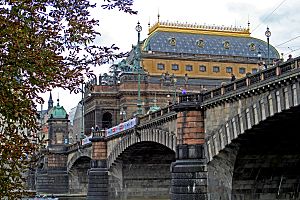
The long-awaited first performance of Smetana's opera Libuše finally happened when the National Theatre opened on June 11, 1881. He was not given tickets at first, but at the last minute, he was invited to the theatre director's box. The audience loved the work, and Smetana was called to the stage many times. Soon after, the new theatre was destroyed by fire. Even though he was ill, Smetana helped raise money to rebuild it. The restored theatre reopened on November 18, 1883, again with Libuše.
During these years, Smetana became more and more recognized as the most important composer of Czech national music. This was celebrated by several events. On January 4, 1880, a special concert in Prague marked 50 years since his first public performance. Smetana attended and played his Piano Trio. In May 1882, The Bartered Bride had its 100th performance, which was a very rare event for a Czech opera. A big concert and dinner were planned for Smetana's 60th birthday in March 1884, but he was too ill to go.
Illness and Death
In 1879, Smetana wrote to a friend that he feared he was losing his mind. By the winter of 1882–83, he was feeling depressed, couldn't sleep, and had strange visions. He also had dizziness, cramps, and sometimes couldn't speak. In 1883, he started a new music suite, Prague Carnival, but could only write a small part. He began a new opera, Viola, but only wrote fragments as his mental health got worse. By mid-February 1884, he was no longer thinking clearly and sometimes became violent. On April 23, his family could no longer care for him. They took him to the Kateřinky Lunatic Asylum in Prague, where he died on May 12, 1884.
Smetana's funeral was on May 15 at the Týn Church in Prague's Old Town. A large crowd followed the procession to the Vyšehrad Cemetery. His grave later became a place where music lovers visit in Prague. On the night of the funeral, a planned performance of The Bartered Bride at the National Theatre went ahead. The stage was draped in black cloth to show respect.
Smetana was survived by Bettina, their daughters Zdeňka and Božena, and his daughter Žofie. Bettina lived until 1908. Žofie died in 1902. The younger daughters married and lived private lives. A lasting tribute to Smetana is the Bedřich Smetana Museum in Prague. It was founded in 1926 and moved to a building on the banks of the Vltava river in 1936.
The asteroid 2047 Smetana was named in his honor.
Smetana's Music
Smetana's music often showed nationalism, realism, and romanticism. A special part of his later music is that it tells a story. All his major works, except his operas, are written to a program or idea. Many are even about his own life. Experts say that Liszt, Wagner, and Berlioz were big influences on his work.
Piano Music
Most of Smetana's early works before he went to Gothenburg were for piano. Some of these early pieces were very showy. But after studying with Proksch, Smetana's piano music became more refined. His Six Characteristic Pieces from 1848 were dedicated to Liszt, who called them "outstanding." Smetana also planned a series of short piano pieces called "album leaves." After he returned from Gothenburg and focused on opera, he didn't write for the piano for 13 years.
In his last ten years, Smetana composed three important piano cycles. The first, from 1875, was called Dreams. It was dedicated to his former students who helped raise money for his medical care. It also honored composers like Schumann, Chopin, and Liszt. Smetana's last major piano works were the two Czech Dances cycles from 1877 and 1879. He wanted to make the polka dance as important as Chopin made the mazurka. The second cycle is a mix of dances, each with a specific name.
Songs and Choral Music
Smetana's early songs were settings of German poems for one voice. Besides his 1848 Song of Freedom, he didn't start writing for a full choir until after his time in Gothenburg. Then he composed many works for the Hlahol choral society, mostly for male voices without instruments. Smetana's choral music is usually patriotic. It ranges from short pieces like the Ceremonial Chorus to longer works like Song of the Sea.
Towards the end of his life, Smetana returned to writing simple songs. His final completed work, Our Song (1883), is a happy celebration of Czech song and dance. This piece was lost for many years and was only performed for the first time after it was found again in 1924.
Chamber Music
Smetana wrote only four chamber works, but each one was very personal to him. The Piano Trio in G minor from 1855 was written after his daughter Bedřiška died. Its style is similar to Robert Schumann's, with hints of Liszt, and it has a sad tone.
It was 20 years before he wrote another chamber piece, his first String Quartet. This E minor work, called From My Life, tells the story of his life. It shows his youthful passion for music, his friendships, his loves, and then, sadly, the start of his deafness. His second String Quartet, in D minor, was written in 1882–83. He wrote it even though his doctor told him not to do any music. It shows Smetana's frustrations with his life, but it also has a bright polka. Between the two quartets, he wrote a violin and piano duet called From the homeland. It mixes sadness and happiness and uses Czech folk music.
Orchestral Music
Smetana was not happy with his first big orchestral work, the D major Overture of 1848. He studied music by Beethoven, Mendelssohn, Weber, and Berlioz before writing his Triumphal Symphony in 1853. This symphony was not accepted by the Court and was not well-received at its first performance. But Smetana didn't give up on it. It was liked in Gothenburg in 1860, and a changed version was performed in Prague in 1882. It is now sometimes called the Festive Symphony.
Smetana's visit to Liszt in 1857, where he heard Liszt's Faust Symphony, changed how Smetana wrote orchestral music. These works helped Smetana understand how to structure orchestral music and how to express stories through music. This helped Smetana write the three Gothenburg symphonic poems: Richard III, Wallenstein's Camp, and Hakon Jarl. These works showed that Smetana had become a modern composer who could handle large musical forces.
From 1862, Smetana mostly worked on operas. He didn't return to purely orchestral music until he started Má vlast in 1872. Má vlast is seen as a symbol of the Czech national struggle. It is the first of Smetana's big works that doesn't use words, and its musical ideas are bolder than anything he had tried before. It shows "a cross-section of Czech history and legend and impressions of its scenery." This work has made Smetana famous beyond his home country, except for The Bartered Bride Overture. Smetana dedicated Má vlast to the city of Prague. After its first performance in November 1882, Czech music lovers praised it as the true example of Czech national style. Its "Vltava" movement, which shows the river flowing through Prague, is Smetana's most famous orchestral piece.
Opera Music
Smetana had almost no one before him in Czech opera. He wanted to create a new style. Instead of using traditional folk songs, Smetana used the popular dance music of his youth, especially the polka. He used ideas from European traditions, but he didn't use many arias. He preferred to base his operas on groups of singers and choirs.
Smetana followed Wagner's ideas for opera, believing they would save the genre. But he denied being too much like Wagner. He said he was busy with "Smetanism, for that is the only honest style!" The first four operas are very "national" in character. The last three, written when Smetana was deaf, are more romantic. The first of these, The Kiss, is described as a work of beautiful music, with both sad and happy moments. Smetana's writer for "The Kiss" was the young Eliška Krásnohorská, who also wrote the stories for his last two operas. She had a lot of influence over the sick composer. Still, critics say Smetana's musical skills did not decline in these works. His improved Czech language skills meant his settings of the language were much better.
Smetana's eight operas created the foundation of Czech opera. But only The Bartered Bride is performed regularly outside of the Czech Republic. After reaching Vienna in 1892 and London in 1895, it quickly became a part of opera companies worldwide. Its famous overture, which is very lively, was written before Smetana even got the full story. Smetana himself later said The Bartered Bride was "merely child's play." Some critics believe Smetana's creative power was at its peak with his third opera, Dalibor.
His Character and Fame
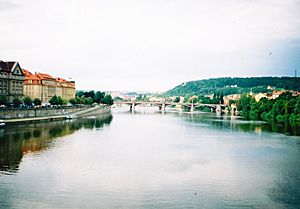
Smetana's biographers say he was physically weak and didn't look very impressive. But when he was young, he had a joy for life that women found attractive. He was also easily excited, passionate, and strong-willed. He was determined to have a music career, even though his father wanted him to be a brewer. Throughout his career, he stood firm. When people criticized him for being too much like Wagner in Dalibor, he responded by writing Libuše, which was even more like Wagner's big music dramas.
His personal life became difficult. His marriage to Bettina was not happy, and it fell apart during his illness and poverty. We don't know much about his relationships with his children. But on the day he was taken to the hospital, his daughter Žofie was "crying as though her heart would break."
Most experts agree that Smetana created Czech opera when there was none before. They also agree that he developed a musical style that matched the growing Czech national spirit. However, some music writers, like Michael Steen, question if "nationalistic music" can truly exist. He says that music is very expressive, but it's not good at describing specific things or ideas on its own. He believes that what listeners hear depends on what they expect to hear.
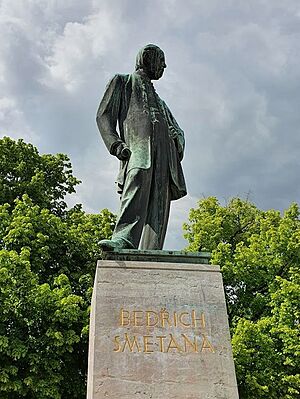
According to music expert John Tyrrell, Smetana's strong connection to Czech nationalism and the sad events of his last years have affected how people judge his work, especially in his home country. Tyrrell says that Smetana's almost legendary status in his homeland meant that any criticism of his life or work was discouraged by Czech authorities, even in the late 20th century. Because of this, Tyrrell claims, a view of Czech music has been spread that plays down the contributions of other composers like Dvořák, Janáček, and Josef Suk. This is different from how he is seen outside the Czech Republic, where Dvořák is much more famous and played more often. Harold Schonberg notes that "Smetana was the one who founded Czech music, but Antonín Dvořák... was the one who popularized it."
Smetana is seen in his homeland as the father of Czech music.
Images for kids
-
Gothenburg, Sweden, Smetana's base between 1856 and 1861
See also
 In Spanish: Bedřich Smetana para niños
In Spanish: Bedřich Smetana para niños
- Statue of Bedřich Smetana, Prague


